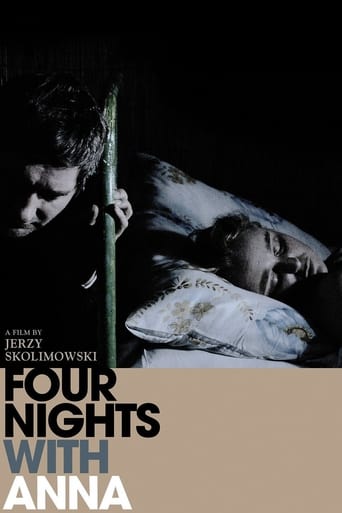Armand
a man. a woman. a hospital. four nights in a room watching object of love. two windows. a cat. and the gray atmosphere. few words.a ring. and a fake accusation. different fact of a small world. nothing else. and precision of a story as delicate work of a remarkable director. a film about solitude, desire and sin. sad and common. slice of stone in the light of hot ash. not a lesson, not an event. only testimony about a strange search of happiness. part of every existence, this story is almost a mirror.or only postcard from yourself deep places. cruel, touching and empty of colors, it is shadow of an usual tragedy with many labels.story of love, it is reflection of hate. nothing else.
Wieger Salazar
Just Wonderful, in two words, it's an almost non-spoked drama film, that achieves immerse the audience into the story by the brilliant playing of the lead role by Artur Steranko, main character it's a loneliness guy who find company looking through the window at the apartment across side yard, he creates a love story for himself involving Anna (girl's apartment) with whom he has been involved in a criminal act been innocentEvery scene has been very well directing and played, when i saw it i was involved easily in the plot, audio track is very good, scenery and locations were chosen carefully to develop characters and plot, i haven't followed Skolimowski's work but after this film i'm impatient to see new films from him
johno-21
I recently saw this at the 2009 Palm Springs International Film Festival. After a long absence from film noted Polish filmmaker Jerzt Skolimowski was coaxed back into film-making to to write and direct a small feature film which became this film Four Nights with Anna. Skolimowski was at the screening and explained that a producer wanted him involved in a major film as a director but wanted him first to direct a smaller film to show that he was still a competent filmmaker. Co-written with his wife Eva Piaskowska this film is set in northern Poland in a bleak environment of a small northern town and is the story of Leon (Artur Steranko) who works for a hospital crematorium and lives on the hospital grounds with his ailing grandmother. Across from their house is the nurses quarters where Anna (Kinga Preis) lives. Leon is a timid bachelor with a menial job and a criminal history who is infatuated with Anna. This is a dark and dark-looking drama with little dialog and an almost Hitchcock-like suspense but not a heavy suspense prevailing throughout the film. It's a small film but skillfully executed and a wonderful performance by relative unknown Steranko in the lead role. I would give this a 7.0 out of 10.
Chris Knipp
The Polish director, who has not made a film in 17 years, appeared in Croenberg's 'Eastern Promises' as Naomi Watts's racist uncle. His return to the helm is a small, literally very dark, austere and highly assured film about Leon (the excellent Artur Steranko), a lonely, decent man whose shyness and lack of socialization lead him to voyeurism. Living near the hospital crematorium that it's his job to tend, he becomes obsessed with Anna (Kinga Preis), a blond nurse who lives across a muddy field from him.It turns out that Leon has done jail time. He now cares for an aged grandmother who raised him. One day he witnesses Anna being raped. He approaches close but can do nothing. Later he stammeringly reports this to the police, a mistake, because he ultimately becomes the only suspect.For the most part Leon appears to be a night person. He looks through a chink in his wall (later he installs a picture window) through one eye of a pair of binoculars as Anna prepares for bed. After his grandmother dies, he uses her sleeping drafts to drug Anna's tea, and on four separate occasions successfully sneaks into her bedroom, paints her toenails, pets her cat, and himself entering dressed up and drunk after she's had an evening of birthday revelry in her room with a noisy handful of friends, clumsily tries to put a diamond ring he's bought on her finger, tenderly nuzzles her pillow, puts a cover over her on the bed where she sleeps, dozes off under her bed and has nightmares.These sequences are a skillful collaboration between Skolinowski and Steranko and cameraman Adam Sikora. At times the scene is almost total darkness, but several wide landscape shots are beautiful and unique. The style resembles Bela Tarr, or the black drollery of Swedish director Roy Andersson, but J. Hoberman calls the film "New Wave to the bone." Another essential element in the enrichment of such stripped down materials is the delicate orchestral music by Michal Lorenc; film music has never been more needed or more successful. Cezary Grzesiuk's editing is sly and seamless. The story has moments of supreme irony. "Just as you wanted, I'm seeing a woman now," Leon tells his grandmother's grave after his voyeurism has reached the breaking-and-entering stage.The whole has the feel of a Samuel Beckett short story with an added strange, sweet sensuality. There is no harm done. Leon is picked up for the rape. Anna knows he didn't do it, but didn't see the rapist and refuses to testify at the trial. Leon is marked as a weirdo for his toe-nail painting, but Anna visits him once in jail. Later, released, he finds her house gone. It's one of the saddest moments in any film this year. From reports, this is a much milder, tamer film than Skolinowski's younger work (he is now 70), and it's never more than an elaborate development of a very short story, but it's very well done and very distinctive.'Cztery noce z Anna' was introduced as the opener at the Director's Fortnight at Cannes and included in the NYFF, as well as Toronto; opening in France in November 2008.
